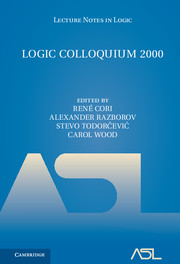Book contents
- Frontmatter
- Introduction
- Contents
- K. Jon Barwise (1942-2000)
- TUTORIALS
- PHOTOGRAPHS
- ARTICLES
- Bounded forcing axioms and the size of the continuum
- Hilbert's wide program
- Rigidity conjectures
- Metapredicative and explicit Mahlo: a proof-theoretic perspective
- A two-dimensional tree ideal
- Psychology looks hopefully to logic
- Russell's logics
- Partitioning pairs of uncountable sets
- Aspects of the Turing jump
- Liouville functions
- References
Psychology looks hopefully to logic
from ARTICLES
Published online by Cambridge University Press: 27 June 2017
- Frontmatter
- Introduction
- Contents
- K. Jon Barwise (1942-2000)
- TUTORIALS
- PHOTOGRAPHS
- ARTICLES
- Bounded forcing axioms and the size of the continuum
- Hilbert's wide program
- Rigidity conjectures
- Metapredicative and explicit Mahlo: a proof-theoretic perspective
- A two-dimensional tree ideal
- Psychology looks hopefully to logic
- Russell's logics
- Partitioning pairs of uncountable sets
- Aspects of the Turing jump
- Liouville functions
- References
Summary
Abstract. The development of science is among the most distinctive accomplishments of the human species. To help clarify how science is achieved, psychologists need a perspective on inductive logic that does not invoke the subjective probability of rival theories. One alternative starts from the all-or-none concept of acceptance as opposed to graded belief. The inductive logic of acceptance is governed by principles of hypothesis selection and revision rather than probability. This theory of inductive logic has already seen development, but many questions remain.
The psychologist's problem. Since its inception in the 19th century, psychological science has made steady progress investigating perceptual and motoric abilities—how the visual system encodes color, for example, or how we shift our gaze to peripheral events. Much less is understood about abilities thatmake us distinctly human. Some information is available about themechanisms of natural language. But there is hardly any insight into how people create scientific theories about the world. This is an embarassing gap for Psychology since scientific achievement is themost distinctive and remarkable feature of our species.
What's blocking progress is that the most natural account of this ability seems to face an insuperable difficulty. According to the account in question, most everyone has an innate disposition to reason in rough conformity with normatively correct principles of deductive and inductive logic—just as most everyone is endowed with perceptual mechanisms that give us a roughly accurate picture of the environment. How else could our ancestors have met the challenges of survival? It is the twin pillars of natural reasoning—deductive and inductive—that allow people to draw out the consequences of rival scientific theories and assign sensible credibilities to each in the light of data.
These vague remarks are just an attempt to prepare for sharper theories. But we stumble even at this initial step, because one of the twin pillars seems to be absent. The problem is not so much with deductive logic. It can be challenging to communicate the informal concept of logical necessity. But once this is achieved, most people distinguish validity from invalidity on an intuitive basis across a broad class of arguments.
- Type
- Chapter
- Information
- Logic Colloquium 2000 , pp. 323 - 334Publisher: Cambridge University PressPrint publication year: 2005



